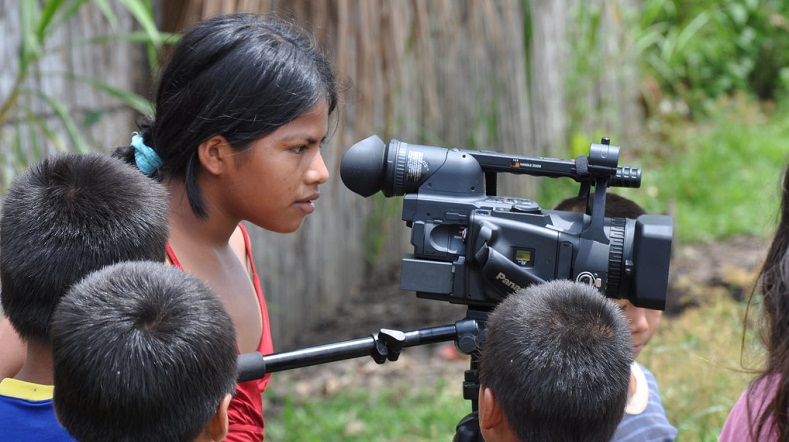Post
Published on February 14, 2023
Now in its fourth year, the Planetary Health Film Lab is an interdisciplinary program featuring a week-long intensive workshop designed to provide participants with the knowledge, skills, and tools to make short documentary films for the United Nations.
The 2023 edition of the Planetary Health Film Lab is an intensive program designed for Indigenous youth from Costa Rica and Belize who have a story to tell about climate change and planetary health and want to do so through film.
During a week-long, in-person workshop to take place in Costa Rica at a site soon to be announced from August 14 to 18, 2023, participants will learn to effectively tell stories from their communities that communicate data, research, and life experiences related to global and planetary health. The workshop teaches specific theories, techniques, and modes of social issue filmmaking and provides hands-on experience with new digital technologies and platforms.
The participants’ documentary short films will be featured on the websites of the United Nations Framework Convention on Climate Change, the Dahdaleh Institute for Global Health Research, and the Youth Climate Report—an influential platform used as a resource by policymakers. The films will also be presented at this year’s UN climate summit, COP28, to be held in Dubai November 30 to December 12, 2023. A series of press conferences and side events will highlight the films, which will directly contribute to progressive policy creation on a global scale.
Learn more about the Planetary Health Film Lab here:

Participants
This year’s Planetary Health Film Lab is designed for Indigenous youth in Central America, specifically, Costa Rica and Belize who are interested in using their filmmaking skills (videography and film editing) to tell stories about the impact of climate change on planetary health as well as on human health and wellbeing in their communities.
We want to bring together Indigenous youth from Costa Rica and Belize with a diversity of lived experiences and perspectives. We will encourage the participants to use their communities’ Indigenous languages along with English titles, subtitles, and credits.
Above all, we are looking for youth with a passion for storytelling through film who are experiencing the urgency of environmental impacts in their home communities.
Eligibility Criteria
- Indigenous youth 18 to 35 years old, residing in Costa Rica or Belize
- proficiency in written and spoken English
- experience producing videos using their own cell phones or video cameras
- experience editing videos using their own computers and editing software
- ability to complete their projects by the program deadline
Important Dates
- Call for participants: February 14, 2023
- Application deadline: April 14, 2023
- Participants notified of acceptance: April 21, 2023
- Introductory Zoom session: May 1, 2023
- Production: May 2 to June 30, 2023
- Post-production: July 1 to 25, 2023
- Community Elder approval: July 31, 2023
- Workshop (virtual and/or in-person): August 14 to 18, 2023
- Micro Film Festival (virtual and/or in-person): August 18, 2023
- UN approval: September 11 to 15, 2023
- Upload to UNFCCC website (YCR): September 18, 2023
- Presentations at UN climate summit, COP28: November 30 to December 12, 2023
Themes | Planetary Health |
Status | Concluded |
Related Work | |
Updates |
N/A
|
People |
You may also be interested in...
Call for Presentations – 2023 Critical Social Science Perspectives in Global Health Workshop
The fourth Critical Social Science Perspectives in Global Health (CPGH) Research workshop returns as an in-person event on Wednesday, March 29 from 9 a.m. to noon ET at the Dahdaleh Institute for Global Health Research. Continental ...Read more about this Post
Hot off the Press – Recent Publications by Dahdaleh Institute Researchers
Research by Dahdaleh Institute Research Fellow James Stinson and his partners has been featured as a case study by the Canadian Climate Institute as part of their "Indigenous Perspectives" series, which showcases exemplary Indigenous work ...Read more about this Post
Dahdaleh Institute Researchers Awarded Major Funding from SSHRC
Congratulations to Dahdaleh Institute faculty fellow and PI Amrita Daftary and director and co-applicant James Orbinski, who received a 3-year Social Sciences & Humanities Research Council of Canada (SSHRC) Partnership Development Grant for "A Global ...Read more about this Post
